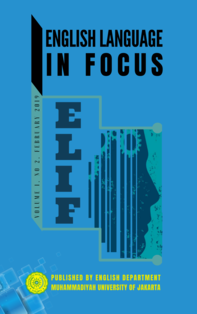Multiple Intelligences (MI) on Developing Speaking Skills
DOI:
https://doi.org/10.24853/elif.1.2.127-136Keywords:
multiple intelligences, speaking skills, English.Abstract
The current study investigates the impact of multiple intelligences-based Instructions on developing speaking skills of the students of English. Therefore, the problem of the current study can be stated in the lack of speaking skills of the students of English school in Junior High School, MTs Al-Ihsan Jakarta Barat. To confront this problem, the researcher developed a multiple intelligences-based program to enhance the speaking skills paying due attention to the individual differences among students. The sample of the study consisted of sixty fourth-year perspective students of English. The Quasi-experimental research design was used in the study as the researcher used the one group post-test to assess the usefulness of using this approach. Results of the study proved the effectiveness of Multiple Intelligences-(MI) On Developing Speaking Skills of the 9th Grade Students’ of MTs Al-Ihsan Jakarta Barat.References
Abdallah, M. M. S. (2005). The Effect of Using a Multiple Intelligences-Based Training Programme on Developing English Majors’ Oral Communication Skills. (Assiut University).
Bailey, K. M. (2005). Practical English Language Teaching: Speaking. McGraw-Hill ESL/ELT (p. 199). McGraw-Hill ESL/ELT.
Greenbaum, S., & Nelson, G. (1996). The International Corpus of English (ICE) Project. World Englishes, 15(1), 3–15. https://doi.org/10.1111/j.1467-971X.1996.tb00088.x
Harmer, J. (2001). The Practice of English Language Teaching. London: Pearson Education Limited.
Jondeya, R. S. The Effectiveness Of Using Information Gap On Developing Speaking Skills For The Eighth Graders In Gaza Governorate Schools. Diss. Al-Azhar University-Gaza, 2011.
Kline, J.A. 2001. Speaking Effectively: A Guide for Air Force Speakers. Alabama:Air University Press
Kramsch, C. J. (1993). Context and culture in language teaching. Oxford: Oxford University Press.
Nunan, D. (2002). Listening in Language Learning. In J. C. Richards & W. A. Renandya (Eds.), Methodology in Language Teaching: An Anthology of Current Practice (pp. 238–241). Cambridge: Cambridge University Press.
Richards, J. C. (2008). Teaching Listening and Speaking: From Theory to Practice. New York: Cambridge University Press.
Turk, C. (2003). Effective Speaking: Communicating in Speech. London: E. & F.N. Spon.
Purpura, J. E. (2013). Assessing Grammar. In The Companion to Language Assessment (pp. 100–124). John Wiley & Sons, Inc. https://doi.org/10.1002/9781118411360.wbcla147
Downloads
Published
Issue
Section
License
Authors who publish with this journal agree to the following terms:
- Authors retain copyright and grant the journal right of first publication with the work simultaneously licensed under a Creative Commons Attribution License that allows others to share the work with an acknowledgment of the work's authorship and initial publication in this journal.
- Authors can enter into separate, additional contractual arrangements for the non-exclusive distribution of the journal's published version of the work (e.g., post it to an institutional repository or publish it in a book), with an acknowledgment of its initial publication in this journal.
- Authors are permitted and encouraged to post their work online (e.g., in institutional repositories or on their website) before and during the submission process, as it can lead to productive exchanges, as well as earlier and greater citation of published work (See The Effect of Open Access).


